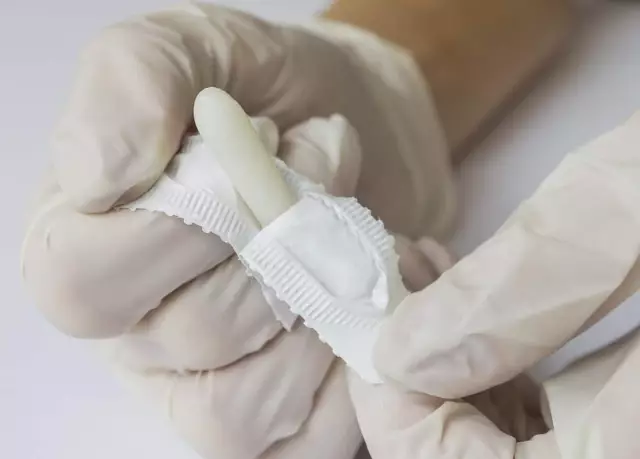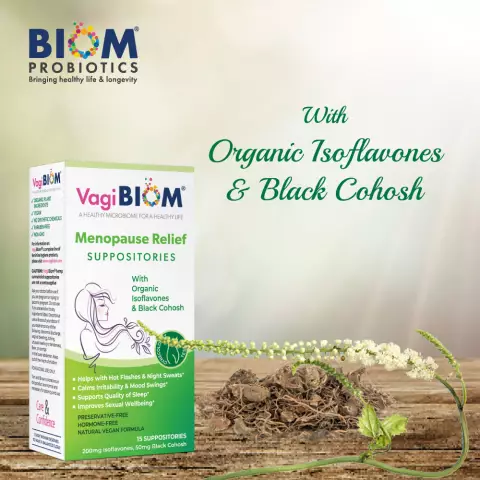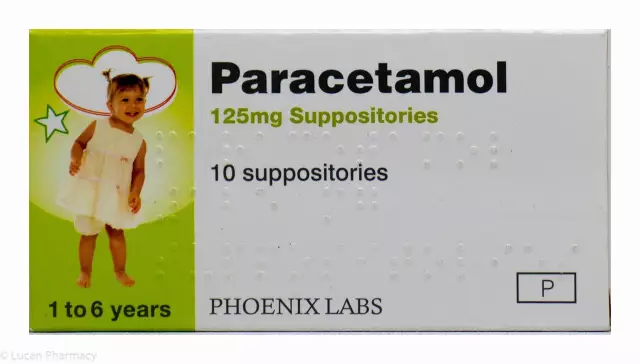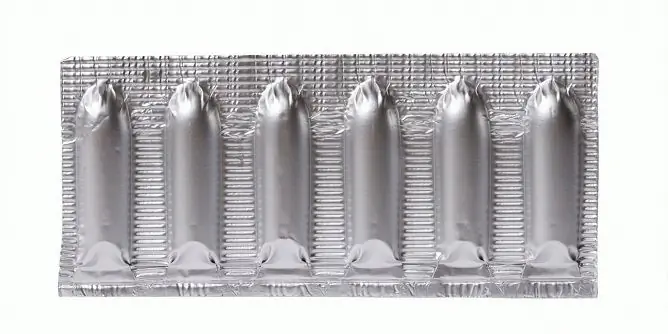- Author Rachel Wainwright wainwright@abchealthonline.com.
- Public 2023-12-15 07:39.
- Last modified 2025-11-02 20:14.
Pimafucin
Pimafucin: instructions for use and reviews
- 1. Release form and composition
- 2. Pharmacological properties
- 3. Indications for use
- 4. Contraindications
- 5. Method of application and dosage
- 6. Side effects
- 7. Overdose
- 8. Special instructions
- 9. Use in childhood
- 10. Drug interactions
- 11. Analogs
- 12. Terms and conditions of storage
- 13. Terms of dispensing from pharmacies
- 14. Reviews
- 15. Price in pharmacies
Latin name: Pimafucin
ATX code: A07AA03, G01AA02
Active ingredient: natamycin (natamycin)
Manufacturer: Temmler Italia, S. r. L. (Italy)
Description and photo update: 2019-16-08
Prices in pharmacies: from 189 rubles.
Buy

Pimafucin is an antifungal polyene antibiotic from the macrolide group, which has a predominantly fungicidal effect.
Release form and composition
- Enteric-coated tablets: round, almost white or white (20 tablets in dark glass bottles, 1 bottle in a cardboard box);
- Cream for external use 2%: from white to light yellow (30 g each in aluminum or plastic tubes, 1 tube in a cardboard box);
- Vaginal suppositories: torpedo-shaped, from white-yellowish to light brownish-yellow color (3 pcs. In strips of aluminum foil, 1 or 2 strips in a cardboard box).
The active substance is natamycin:
- 1 tablet - 0.1 g;
- 1 g cream - 0.02 g;
- 1 suppository - 0.1 g.
Additional components of the tablets:
- Excipients: povidone K30, potato starch, lactose monohydrate, magnesium stearate;
- Shell composition: methyl parahydroxybenzoate, sucrose, titanium dioxide, gelatin, acacia gum, kaolin, talc, white beeswax, calcium carbonate, triacetin, cellacefate.
Excipients of the cream: decyloleate (cetiol V), methyl parahydroxybenzoate, propylene glycol, cetostearyl alcohol, sodium lauryl sulfate, cetyl ether wax, propyl parahydroxybenzoate, purified water.
Excipients of suppositories: solid fat, sodium bicarbonate, sorbitan trioleate, cetyl alcohol, adipic acid, polysorbate 80.
Pharmacological properties
Pharmacodynamics
Natamycin irreversibly binds to ergosterol contained in the cell membrane of the fungal cell, which leads to a violation of its integrity, loss of cytoplasmic content and cell death. The substance is active against most pathogenic molds and yeasts, including those belonging to the genera Penicillium, Candida, Fusarium, Cephalosporium and Aspergillus. P. boydii and dermatophytes are less sensitive to natamycin. No cases of drug resistance have been reported at the moment. Pimafucin in the form of enteric tablets acts only in the intestinal lumen.
Pharmacokinetics
Natamycin is not absorbed from the gastrointestinal tract and has no systemic effect.
Indications for use
For tablets:
- Intestinal candidiasis;
- Acute atrophic and acute pseudomembranous candidiasis with immune deficiency or cachexia, as well as after therapy with cytostatics, antibiotics or corticosteroids;
- Candidiasis of the skin and mucous membranes (including vulvitis, candidal vaginitis and vulvovaginitis) - for the sanitation of the intestinal reservoir of Candida fungi.
For the cream - fungal diseases of the mucous membranes and skin caused by pathogens sensitive to natamycin, including:
- Otitis externa caused by fungi or complicated by candidiasis;
- Candidiasis of the skin and nails;
- Dermatomycosis;
- Vulvitis, vaginitis, balanoposthitis, vulvovaginitis caused by Candida.
For suppositories - fungal diseases of the mucous membranes of the genital organs, caused mainly by fungi of the genus Candida:
- Vulvitis;
- Vaginitis;
- Vulvovaginitis.
Contraindications
According to the instructions, Pimafucin is contraindicated in case of hypersensitivity to its components.
In a tablet dosage form, the drug is not recommended for young children due to possible difficulties in swallowing tablets.
Instructions for use of Pimafucin: method and dosage
Enteric-coated tablets
Pimafucin tablets should be taken orally. Food intake does not affect the effectiveness of the drug.
Recommended doses:
- Intestinal candidiasis: adults - 0.1 g 4 times a day, children - 0.1 g 2 times a day. The duration of treatment is on average 7 days;
- The persistent course of vaginitis caused by Candida fungi (in combination with a local antifungal drug, for example, suppositories Pimafucin): 0.1 g 4 times a day for 10-20 days.
The duration of the course of therapy is set individually. Treatment should be continued for several more days after the disappearance of the clinical symptoms of the disease.
Cream for external use
Pimafucin cream should be applied to the affected area 1-4 times a day.
In case of mycosis of the external auditory canal, before applying the cream, it is necessary to clean the ears, and after applying the drug, place a tampon made of natural material (cotton or wool) in the ear canal.
The duration of the course of therapy is set individually. Treatment should be continued for several more days after the disappearance of the clinical symptoms of the disease.
For chronic and recurrent infections, cream treatment can be supplemented with pills.
Vaginal suppositories
Pimafucin should be injected deep into the vagina, in the supine position, 1 suppository 1 time per day at night, the duration of treatment is 3-6 days.
With a persistent course of vaginitis, suppositories are used in combination with Pimafucin tablets (1 tablet 4 times a day for 10-20 days). For the treatment of candidal lesions of the genitals of a partner, Pimafucin cream is used.
The duration of the course of therapy is set individually. Treatment should be continued for several more days after the disappearance of the clinical symptoms of the disease.
Side effects
- When using tablets: nausea and diarrhea (usually occur in the first days of treatment and go away on their own with continued therapy);
- When applying the cream and suppositories: burning sensation, slight irritation.
Overdose
In clinical practice, there are currently no known cases of Pimafucin overdose.
special instructions
1 tablet of Pimafucin contains 66 mg of lactose monohydrate and 122 mg of sucrose. Before using the drug in this dosage form, it is imperative to consult a doctor with a doctor for patients with rare congenital galactose / fructose intolerance, sucrase-isomaltase deficiency, glucose-galactose malabsorption, lapp lactase deficiency.
Suppositories should not be used during menstruation.
There is no need to exclude sexual intercourse during the period of treatment with suppositories. However, it is necessary to examine both sexual partners and conduct a course of therapy if candidal lesions are detected. In addition, barrier contraception should be used.
Pimafucin does not affect the speed of reactions and the ability to concentrate.
According to indications, the drug can be used during pregnancy and lactation.
Pediatric use
Pimafucin can be used in newborns.
Drug interactions
There is no information on drug interactions with Pimafucin.
Analogs
Pimafucin analogs are: Alpha Normix, Nystatin-Health, Nystatin, Livarol, Clotrimazole, Primafungin, Ekofutsin.
Terms and conditions of storage
Keep out of the reach of children.
Shelf life:
- Tablets - 4 years at temperatures up to 25 ºС;
- Cream for external use - 4 years at a temperature of 15-25 ºС;
- Vaginal suppositories - 2 years at temperatures up to 25 ºС.
Terms of dispensing from pharmacies
Available without a prescription.
Reviews about Pimafucin
Reviews of Pimafucin indicate that most patients after a course of treatment have a positive effect. However, in some cases, the woman's condition remains the same or even worsens. Some patients complain that the effect of treating thrush and some other diseases is short-lived. Overall, however, Pimafucin quickly eliminates the symptoms of thrush. Cream and pills work equally well on women and men and can be used not only for treatment, but also for the prevention of candidiasis.
There are often good reviews about Pimafucin in the form of tablets: it is successfully used according to indications and begins to act quickly, and there are practically no side reactions. The drug in the form of vaginal suppositories usually eliminates the symptoms of candidiasis as soon as possible, since it has a local effect, unlike tablets. There are no negative opinions about the Pimafucin cream, it is well tolerated and effective for any fungal diseases. It is also often prescribed to men.
During pregnancy, Pimafucin does not affect the development of the fetus and helps pregnant women to forget about the manifestations of the disease in just a few days.
Price for Pimafucin in pharmacies
On average, the price of Pimafucin in tablets in pharmacy chains is 504-530 rubles (the package contains 20 pcs.). You can buy vaginal suppositories for about 515‒555 rubles (6 pcs are included in the package) or 265‒291 rubles (3 pcs are included in the package). The cost of a cream for external use varies from 318 to 350 rubles.
Pimafucin: prices in online pharmacies
|
Drug name Price Pharmacy |
|
Pimafucin 100 mg vaginal suppositories 3 pcs. 189 r Buy |
|
Pimafucin vaginal suppositories. 100mg 3 pcs. 204 RUB Buy |
|
Pimafucin 100 mg vaginal suppositories 6 pcs. RUB 300 Buy |
|
Pimafucin 2% cream for external use 30 g 1 pc. 339 r Buy |
|
Pimafucin cream 2% 30g 352 r Buy |
|
Pimafucin vaginal suppositories. 100mg 6 pcs. 392 RUB Buy |
|
Pimafucin 100 mg enteric-coated tablets 20 pcs. RUB 485 Buy |
|
Pimafucin tablets p.p. enteric solution. 100mg 20 pcs. RUB 511 Buy |
| See all offers from pharmacies |

Maria Kulkes Medical journalist About the author
Education: First Moscow State Medical University named after I. M. Sechenov, specialty "General Medicine".
Information about the drug is generalized, provided for informational purposes only and does not replace the official instructions. Self-medication is hazardous to health!






